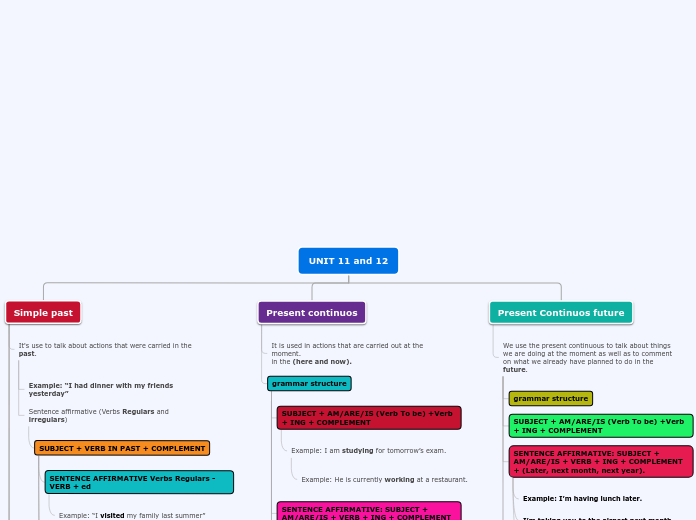UNIT 11 and 12
Simple past
It's use to talk about actions that were carried in the past.
Example: “I had dinner with my friends yesterday”
Sentence affirmative (Verbs Regulars and irregulars)
SUBJECT + VERB IN PAST + COMPLEMENT
SENTENCE AFFIRMATIVE Verbs Regulars - VERB + ed
Example: “I visited my family last summer”
SENTENCE AFFIRMATIVE Verbs Irregulars - VERB CONJUGATED IN PAST
Example: “She went to the cinema yesterday”
any verb that a vowel sound or the sounds (t and d) the pronunciation is with "id"
Example: wanted, started, recorded
any verb that a vowel sound or the sounds (y, l, m, n, j, r, g, b, v, w, z and e) the pronunciation is with "d"
Example: Ordered, improved, cleaned
any verb that a vowel sound or the sounds (p, k, f, s, sh, ch, c, x and th) the pronunciation is with "T"
Example: talked, helped, finished
SENTENCE NEGATIVE SUBJECT + DID NOT + VERB IN INFITIVE + COMPLEMENT
Example: My brothers didn`t lived in Canada
SENTENCE INTERROGATIVE DID + SUBJECT + VERB(SIMPLE FORM) + COMPLEMENT
Example: did you have an adventure last year?
SENTENCE INTERROGATIVE USING QUESTION WORDS (WH) WH + DID + SUBJECT + VERB (SIMPLE FORM) + COMPLEMENT
Example: Who did he go with?
What did they see there?
ADVERBS
Some adverbs that are use in sentences in the past simple
Example: Yesterday, last year, last week, last night, ago (five minuts ago)
Present continuos
It is used in actions that are carried out at the moment.
in the (here and now).
grammar structure
SUBJECT + AM/ARE/IS (Verb To be) +Verb + ING + COMPLEMENT
Example: I am studying for tomorrow’s exam.
Example: He is currently working at a restaurant.
SENTENCE AFFIRMATIVE: SUBJECT + AM/ARE/IS + VERB + ING + COMPLEMENT
1ST Person: SINGULAR- (I am talking) PLURAL- (We are talking)
2ND Person: SINGULAR- (You are talking) PLURAL- (You are talking)
3RD Person: SINGULAR- (He/She/ It is talking) PLURAL- (They are talking)
Example: I am making a cake for his birthday
SENTENCE NEGATIVE: SUBJECT + AUXILIARY VERB + NOT + VERB + ING + COMPLEMENT
1ST Person: SINGULAR- (I am not talking) PLURAL- (We are not talking)
2ND Person: SINGULAR- (You are not talking) PLURAL- (You are not talking)
3RD Person: SINGULAR- (He/She/ It is not talking) PLURAL- (They are not talking)
We also use the contracted form of is not (isn’t) and are not (aren’t).
Example: I am not talking to Karen. I am angry.
SENTENCE INTERROGATIVE: AUXILIARY VERB + SUBJECT + VERB + ING + COMPLEMENT
Example: Are they coming for dinner?
Is he working on Saturdays?
Am I doing the right thing?
SENTENCE INTERROGATIVE USING QUESTION WORDS (WH) WH + AUXILIARY VERB + SUBJECT + VERB + ING + COMPLEMENT
Example: What is she working on Sundays?
Present Continuos future
We use the present continuous to talk about things we are doing at the moment as well as to comment on what we already have planned to do in the future.
grammar structure
SUBJECT + AM/ARE/IS (Verb To be) +Verb + ING + COMPLEMENT
SENTENCE AFFIRMATIVE: SUBJECT + AM/ARE/IS + VERB + ING + COMPLEMENT + (Later, next month, next year).
Example: I’m having lunch later.
I’m taking you to the airport next month.
I’m coming next year.
SENTENCE NEGATIVE: SUBJECT + AUXILIARY VERB + NOT + VERB + ING + COMPLEMENT
Example: I’m not flying to Rome.
I’m not driving you next Thursday.
I'm not taking you home tomorrow
SENTENCE INTERROGATIVE: AUXILIARY VERB + SUBJECT + VERB + ING + COMPLEMENT
Example: Are you studying this evening?
Is she bringing a cake tomorrow?
Are you having a baby?
